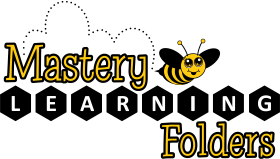If you're a teacher (or parent), there's a very important piece of research you need to know: what we observe during lessons is not a good indication that learning that has moved into long term memory (Bjork, 1999). This means that our students–or our child–may demonstrate that they understand and can recall learning in the short term, but if this content is not practised, it is likely to be lost over the coming days and weeks.
Teachers and lecturers, parents and tutors can catapult their student results by providing them with practise! According to learning science research, the best kind is quizzing over increasing periods of time ("spaced retrieval practice"). Nothing beats the buzz and satisfaction of seeing our students make progress and be excited about it–it's why we teach!
A Mastery Learning Folder makes this type of practise easy–five minutes a day during the week based on each child's classroom learning or to address learning gaps (with free flashcards!). Learning is made durable for students of any age, across subject areas and for behavioural goals, because the focus is on remembering.
How do they work? Check out your context below ...
Mastery Learning Folders ... for lessons worth remembering.
Spaced retrieval practice is one of several cognitive psychology based learning strategies used within the Mastery Learning Folder process. Others include interleaved practice, elaboration and strategies for metacognitive development which assist students to regulate and monitor their own learning.
References
Bjork, R. A. (1999). Assessing our own competence: Heuristics and illusions. In D. Gopher & A. Koriat (Eds.), Attention and performance. Attention and performance XVII: Cognitive regulation of performance: Interaction of theory and application (p. 435–459). The MIT Press.
Centennial College. (2020, May 13). Spaced Retrieval [Video]. You Tube. https://youtu.be/PfQuuA_GbGE

“To date, more than 300 experiments in more than 150 articles dating back more than 100 years (Abbott, 1909) have shown that practice tests that require recall of target information from memory (i.e., retrieval practice) improve memory” (Rawson & Dunlosky, 2011, p. 283).






